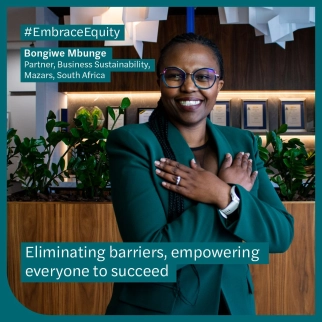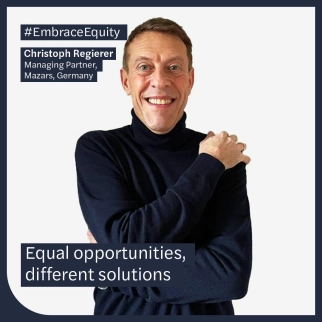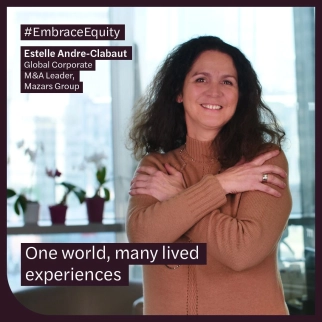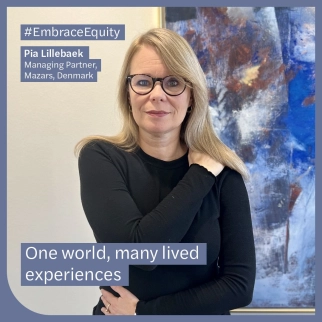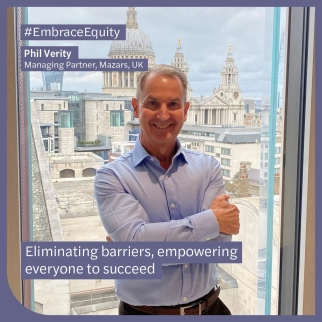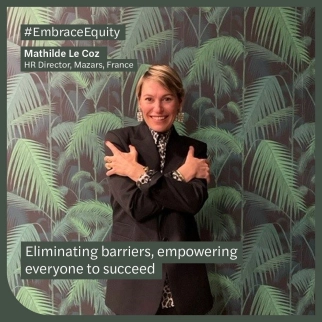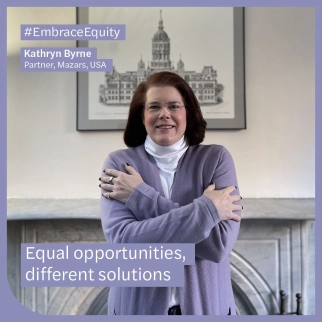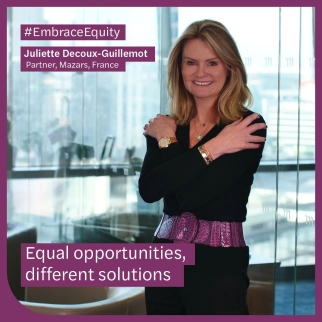Read Bongiwe's full interview
How do you understand equity and how does it compare to equality and diversity?
Equity is rooted in a commitment to redress past injustices. Authentically aiming for equity achieves a sense of belonging.
How, as a leader, do you build equity in the workplace?
I get to know each team member well. When they are working on a task or project that stretches their technical ability, I make sure to create a base of psychological safety so that they feel free to perform without being afraid of making mistakes.
Can you share specific needs that you personally had to address in your career and what helped you succeed?
I digest feedback, particularly the kind I do not like to hear, and then I work towards self-improvement. It’s a method that works for me every time.
Christoph Regierer
Managing Partner, Mazars, Germany
“Equality does not mean equity. Equality focuses on providing equal opportunities. At Mazars, we do more – we actively promote and support each individual to reach an equal outcome.”
Read Christoph's full interview
How do you understand equity and how does it compare to equality and diversity?
Equality does not mean equity. Equality focuses on providing equal opportunities. At Mazars, we do more – we actively promote and support each individual to reach an equal outcome.
How, as a leader, do you build equity in the workplace?
We listen and we act. That includes continuously scrutinising our structures and processes to eliminate barriers and pave the way to equity for our diverse workforce.
Can you share specific needs that you personally had to address in your career and what helped you succeed?
Without the trust and support of my superiors and partners, I would not have been successful. Mutual respect and appreciation among colleagues are essential for an excellent performance as one team.
Rochelle Murugan
Partner, Mazars, South Africa
“To foster equity in our workplace, I take the time to get to know our people by listening to them, embracing their diverse interests and understanding their needs. By doing this, I ensure they are equipped with the appropriate tools to enhance and develop their skillsets so that they can accelerate in their career aspirations by delivering their best efforts.”
Read Rochelle's full interview
How do you understand equity and how does it compare to equality and diversity?
Equality to me is ensuring that the same opportunities, resources and rights are offered and made available to all people within our organisation.
Equity is where we begin to see significant change – it’s achieved once the different needs of people have been considered and understood. It goes beyond ensuring the same opportunities are available for all – it ensures they are fairly provided in relation to the specific needs of people.
Diversity to me relates to embracing the uniqueness that each person brings, including, but not limited to, our backgrounds, value structures, preferences, interests and experiences.
How, as a leader, do you build equity in the workplace?
As a leader, I have always believed that leadership is an act of service, and the only way to be able to serve successfully is to understand the needs of your people. This is directly linked to the importance of being able to communicate effectively, with listening being a key part of communication. So, to foster equity in our workplace, I take the time to get to know our people by listening to them, embracing their diverse interests and understanding their needs. By doing this, I ensure they are equipped with the appropriate tools to enhance and develop their skillsets so that they can accelerate in their career aspirations by delivering their best efforts.
Can you share specific needs that you personally had to address in your career and what helped you succeed?
Transitioning into new roles throughout my career has certainly come with challenges and opportunities. Having the responsibility of leading people comes with many demands and at times it can be overwhelming, but one of my best investments I have made was becoming a professional coach. Since then, I have never underestimated the value that coaching offers. It has allowed me to gain different perspectives, pushed me out of my comfort zone, expanded my thinking and enabled me to build an immense amount of self-awareness. I still apply these deep learnings which allow me to hold myself accountable in many areas of my life.
Estelle Andre-Clabaut
Global Corporate M&A Leader, Mazars Group
“Throughout my career, I’ve learnt that depending on age, cultural background and prior experiences, some people need more time, coaching and training to reach their full potential. I try to understand and identify the needs of my teams to provide them with access to relevant tools.”
Read Estelle's full interview
How do you understand equity and how does it compare to equality and diversity?
Equity, equality and diversity are linked all together. Equity offers rights and opportunities in a fair manner, while equality aims at promoting fairness but can only work if everyone starts from the same place. While equity may look unfair at the beginning, as different people are given different means, it helps everyone achieve the same goal regardless of their starting place. In promoting equity, we have to recognise diversity as each person is unique and needs special care – one size does not fit all!
How, as a leader, do you build equity in the workplace?
As a leader, I attended a training on unconscious bias which has reinforced the importance of managing the biases around me. Throughout my career, I’ve learnt that depending on age, cultural background and prior experiences, some people need more time, coaching and training to reach their full potential. I try to understand and identify the needs of my teams to provide them with access to relevant tools. Also, working in an international organisation, I make sure to not schedule meetings that could be an important date in another culture.
Can you share specific needs that you personally had to address in your career and what helped you succeed?
Fifteen years ago, due to a difficult situation, I needed high flexibility in my work schedule and a stronger work-life balance. I was very lucky to work with an incredible visionary leader who already understood diversity and equity and implemented them into his day-to-day actions. I was given the opportunity to work in a way that best fitted my needs: extensively away from the office (well before Covid), with flexible hours and the trust to be autonomous in my work. This allowed me to balance specific family needs while continuing my work in a job that I was passionate about. This wasn’t very common at the time, and since then I’ve aimed to approach my teams with the same openness.
Pia Lillebaek
Managing Partner, Mazars, Denmark
“Embracing equity is to embrace diversity and inclusion. Through the process of equity, we can reach equality.”
Read Pia's full interview
How do you understand equity and how does it compare to equality and diversity?
Embracing equity is to embrace diversity and inclusion. Through the process of equity, we can reach equality.
How, as a leader, do you build equity in the workplace?
I build equity in the workplace by continuously articulating and being aware of bias, risk of discrimination and privilege blindness.
Can you share specific needs that you personally had to address in your career and what helped you succeed?
Being a woman, I have experienced situations where boundaries were crossed, including being talked down to and being excluded from opportunities due to gender. I’ve overcome this by speaking out, saying things such as “If I said that to you, how would you experience it?” or “How would you view your comment if someone spoke that way with your wife, sister or daughter?”. It has led to open and meaningful conversations.
Uhabia Ojike
Managing Partner, Mazars, Nigeria
“My career progressed quickly at an early stage, and I was fortunate to have the right mentor. I have learnt that nurturing a culture of respect, open communication, as well as providing mentorship and support for all employees is key.”
Read Uhabia's full interview
How do you understand equity and how does it compare to equality and diversity?
Equity is a commitment to social justice and equal access to opportunities manifested in fair treatment for all people. It considers an individual’s ‘starting point’ when providing resources. It goes beyond equality, which is the concept of treating everyone the same without recourse to differing attributes, and also differs from diversity, which recognises individual differences.
How, as a leader, do you build equity in the workplace?
As a leader in a professional service firm, building equity involves fostering an inclusive culture that values diversity.
Everyone is different; you need to get to know your colleagues so you can provide the right resources to make them grow and excel.
Can you share specific needs that you personally had to address in your career and what helped you succeed?
My career progressed quickly at an early stage, and I was fortunate to have the right mentor. I have learnt that nurturing a culture of respect, open communication, as well as providing mentorship and support for all employees is key.
Julie Laulusa
Managing Partner, Mazars, China
“Respecting equity must be based in the understanding of both equality and diversity. While equality offers each individual the same opportunities and diversity acknowledges that people differ, equity focuses on respect and treating everyone according to their unique circumstances.”
Read Julie's full interview
How do you understand equity and how does it compare to equality and diversity?
Respecting equity must be based in the understanding of both equality and diversity. While equality offers each individual the same opportunities and diversity acknowledges that people differ, equity focuses on respect and treating everyone according to their unique circumstances.
How, as a leader, do you build equity in the workplace?
Equity is a part of our core values at Mazars in China. It gives our employees fair opportunities to grow into leadership positions, ultimately generating greater diversity in the management team.
Can you share specific needs that you personally had to address in your career and what helped you succeed?
A positive mindset. It makes me more agile and resilient. Interpersonal relationships at work are always complex. I’m empathetic to everyone’s situation and try to understand others. I see all the difficulties as precious experiences.
Ton Tuinier
Managing Partner, Mazars, Netherlands
“Throughout my career, I have often experienced the right support and guidance at the right time, which has allowed me to grow personally and professionally. I have always had a balanced mix of continuous learning alongside a passion for my profession that has driven me in my career. What has helped me the most has been the people around me who have provided opportunities and challenges to further develop myself.”
Read Ton's full interview
How do you understand equity and how does it compare to equality and diversity?
Equity actively goes a step further and refers to fairness and equality in outcome, not just in support and opportunity. Equity, unlike equality, acknowledges that different people face different barriers to success and works to limit or eliminate these barriers.
How, as a leader, do you build equity in the workplace?
It starts with addressing equity and understanding that it is all about the needs of every person and valuing their contribution and input without biases. It is about enabling each individual to reach their full potential. We build equity in our organisation on the foundation of our vision: “Mazars, a global school of excellence, a great place to learn, for all”. We give everyone the support and tools they need to be successful; and just as our people all come from unique walks of life, we acknowledge that the support and tools may look different from one Mazarian to the next.
Can you share specific needs that you personally had to address in your career and what helped you succeed?
Throughout my career, I have often experienced the right support and guidance at the right time, which has allowed me to grow personally and professionally. I have always had a balanced mix of continuous learning alongside a passion for my profession that has driven me in my career. What has helped me the most has been the people around me who have provided opportunities and challenges to further develop myself.
Phil Verity
Managing Partner, Mazars, UK
“All leaders have an important part to play in learning and understanding different lived experiences of the team. This enables leaders to build empathy which is critical for equity.”
Read Phil's full interview
How do you understand equity and how does it compare to equality and diversity?
For me equity is fairness: people are treated fairly based on their individual situation, which is different. Equality means everyone gets treated the same – which doesn’t take into account our differences. It is important to me that everyone has the individual tools needed to be their best.
It is about embracing uniqueness, recognising individual differences and ensuring everyone is set up to do their best.
How, as a leader, do you build equity in the workplace?
A goal of leaders can be to create equity in the workplace. This means challenging our own assumptions that everyone has the same needs. All leaders have an important part to play in learning and understanding different lived experiences of the team. This enables leaders to build empathy which is critical for equity.
Mathilde Le Coz
HR Director, Mazars, France
“Equity is about fairness; it’s about making sure that everyone has an equal chance to succeed. To achieve equity, we must correct the imbalances that stand in the way of everyone getting a true and fair chance.”
Read Mathilde's full interview
How do you understand equity and how does it compare to equality and diversity?
Equity is about fairness; it’s about making sure that everyone has an equal chance to succeed. To achieve equity, we must correct the imbalances that stand in the way of everyone getting a true and fair chance. Unlike equality, equity does not assume that the same rules are applied to everyone. This also differs from diversity, which is about including different people from different backgrounds, histories, beliefs and points of view.
How, as a leader, do you build equity in the workplace?
As a leader, my role is to ensure that we are aware of the imbalances and biases we may have in terms of how we see the world and ensure that we put the correct measures in place to enable everyone to have an equal opportunity to accomplish their goals.
Can you share specific needs that you personally had to address in your career and what helped you succeed?
During my career, I had to learn to reconcile my family responsibilities as a mother of three children, with my responsibilities as a professional. The training I received on women’s leadership in my early years has helped me to accept the different cycles I have experienced throughout my career so that with each change, I can comfortably find my place as both a mother and a leader.
Karin Westerlund
Managing Partner, Mazars, Sweden
“To give each and every person equal conditions is a great thought, but the result of it could easily and unintentionally land in injustice since we are all different in terms of learning and developing. To give each individual the possibilities and the tools they need to bloom and develop at their own pace and in their own ways based on their individual needs is what equity is all about.”
Read Karin's full interview
How do you understand equity and how does it compare to equality and diversity?
To give each and every person equal conditions is a great thought in theory, but it could easily and unintentionally result in injustice, since we are all different in terms of learning and developing. To give each individual the possibilities and the tools they need to bloom and develop at their own pace and in their own ways based on their individual needs is what equity is all about. By thinking this way, we can take care of everyone’s different knowledge and become even stronger together as a team.
How, as a leader, do you build equity in the workplace?
In my role as a leader, I think it is important that I encourage our people to speak their mind about how to form their career path and highlight the importance of saying, and not only thinking, what they wish for. We focus to a high extent on creating and maintaining a sustainable workforce, setting the spotlight on questions important to our employees (and finding appropriate solutions?).
Can you share specific needs that you personally had to address in your career and what helped you succeed?
For me, it has always been important to be active and speak my mind about wanting to be involved in various assignments. I have also challenged myself many times to dare and say yes when I have been asked to take on new roles within the firm. I believe that is a key factor for success and it is essential that we continue to build an open and encouraging environment.
Kathryn Byrne
Partner, Mazars, USA
“Equity is about providing access based on a person’s needs. With equity, there is an acknowledgment that the access, resources and opportunities may differ from one person to the next in order to achieve the same result. It’s about addressing inequalities to ensure fairness.”
Read Kathryn's full interview
How do you understand equity and how does it compare to equality and diversity?
Equity is about providing access based on a person’s needs. With equity, there is an acknowledgment that the access, resources and opportunities may differ from one person to the next in order to achieve the same result. It’s about addressing inequalities to ensure fairness.
Equality, on the other hand, is about being equal and giving the same access, resources and opportunities to everyone without differentiating between people, while diversity is about including people based on many different criteria such as culture, age, race, sexual orientation and socioeconomic backgrounds.
How, as a leader, do you build equity in the workplace?
As a leader you need to know your team and understand their specific needs. Understanding a team can be achieved through meaningful surveys and training such as unconscious bias training, inclusive leadership training and allyship training.
Can you share specific needs that you personally had to address in your career and what helped you succeed?
As a young senior accountant I had a family medical need earlier in my career, and in order to accommodate my needs, I was allowed to work remotely long before it was the norm. This also happened during a time where everything was still done by paper, so I was sent all the material I needed in boxes.
Véronique Ryckaert
Managing Partner, Mazars, Belgium
“As a leader, we make sure to anticipate equity in our processes as much as possible and try to embed a culture of inclusion overall. This has enabled us to become a more diverse workforce over the last few years.”
Read Véronique's full interview
How do you understand equity and how does it compare to equality and diversity?
Equity is the act of ensuring that processes are fair and provide equal possible outcomes for every individual. Equality is about giving everyone the same chances and treating them the same. Finally, diversity is about valuing the difference between people.
How, as a leader, do you build equity in the workplace?
As a leader, we make sure to anticipate equity in our processes as much as possible and try to embed a culture of inclusion overall. This has enabled us to become a more diverse workforce over the last few years.
Can you share specific needs that you personally had to address in your career and what helped you succeed?
I needed to combine balancing a family with small children with a career. Flexibility has helped me to succeed in doing so.
José Caneda
Managing Partner, Mazars, Switzerland
“It is important to me to give everyone the freedom to develop in the direction they want, with the support and guidance they need from their management. It is the way my colleagues and I work and lead our teams every day and the message we deliver.”
Read José's full interview
How do you understand equity and how does it compare to equality and diversity?
Equality means that every person should have the same rights, opportunities, and resources without considering individual differences that may require special attention, and diversity refers to the recognition and acceptance of differences.
In comparison, equity refers to the idea of giving each person what they need to succeed, regardless of their starting point. The idea is to reduce inequalities by recognising individual differences and providing equitable resources and opportunities to meet the unique needs of each person. The goal is to ensure that everyone has an equal chance to succeed.
How, as a leader, do you build equity in the workplace?
It is important to me to give everyone the freedom to develop in the direction they want, with the support and guidance they need from their management. It is the way my colleagues and I work and lead our teams every day and the message we deliver.
Can you share specific needs that you personally had to address in your career and what helped you succeed?
When I arrived in Switzerland at 10 years old, I didn’t speak French. I was lucky enough to be surrounded by people who supported and advised me to develop my skills, encouraged me to move forward, find my own path and achieve my goals. I am very grateful to them, and this is also the reason why I feel invested in working to eliminate barriers and empower everyone to succeed.
Juliette Decoux-Guillemot
Partner, Mazars, France
“Consistently increasing diversity requires that equity be given priority over equality. Above all, offering equal opportunity of chances, and not equal means, is the only way to create real inclusion.”
Read Juliette's full interview
How do you understand equity and how does it compare to equality and diversity?
Equity is when we consider the needs and contexts of each person to give them the means to have the same chances. It’s often at odds with the concept of equality because it suggests a non-egalitarian distribution of means. For example, in disadvantaged districts, it is fair to have classes with fewer pupils and high-quality teachers who can spend individual quality time with each student, considering they don’t have the same chances of success because at home, their parents can’t support them with their homework. Consistently increasing diversity requires that equity be given priority over equality. Above all, offering equal opportunity of chances, and not equal means, is the only way to create real inclusion.
How, as a leader, do you build equity in the workplace?
It is important to get to know each member of the team well and understand their specific needs, core principles or values so we can help them perform ‘at their best’ and succeed. I try to adapt my management to the needs of each member of my team and I find that this is the most effective way to engage a team in my projects.
Can you share specific needs that you personally had to address in your career and what helped you succeed?
Like many other women, one of the most challenging times of my professional life, when I felt the most ‘insecure’, was the birth of my twins, which coincided with my promotion to partner at Mazars. What helped me was to be supported in my request to reduce my international travels for two years, which had no impact on my performance review. I was also lucky to meet inspiring women, who helped me find my own personal balance.
Raúl Montemayor
Managing Partner, Mazars, Mexico
“As leaders, we must pay attention and actively listen because some individual challenges faced by our teams are likely to be out of sight, so we need to ask questions, take an interest in others and then act accordingly, providing tools, spaces and the means to open the door for everyone to succeed.”
Read Raúl's full interview
How do you understand equity and how does it compare to equality and diversity?
Equality helps us to see and treat all individuals in the same way, no matter what their background is or any other life circumstance they are going through; we all deserve the same respect and to be treated equally. At the same time, this gives space for diversity, enriching our lives and helping us to see things from many different perspectives. On the other hand, equity takes us a step further by considering the different challenges faced by individuals and groups, and by acknowledging these challenges, we can adapt the environment so that individuals can truly find success in life.
How, as a leader, do you build equity in the workplace?
As leaders, we must pay attention and actively listen because some individual challenges faced by our teams are likely to be out of sight, so we need to ask questions, take an interest in others and then act accordingly, providing tools, spaces and the means to open the door for everyone to succeed.
Can you share specific needs that you personally had to address in your career and what helped you succeed?
Adapting without losing my essence is one of the things I learnt early in my career, and it has helped me to work well with teams and people from all over the world.
Cécile Kossoff
Group Chief Brand, Marketing and Communications officer, Global Diversity and Inclusion leader
“Managing diversity is about ensuring that we bring to the table a plurality of individuals, styles, thoughts and skills that offer a fair reflection of our world. Managing equity is about making sure we give to those different people, who have different views, needs and constraints, the same share of voice, the same amount of opportunities, and the right conditions to succeed. Equity is essential to building an equality of chances.”
Read Cécile's full interview
How do you understand equity and how does it compare to equality and diversity?
Obtaining an equality of chances is the ultimate aspiration. While all individuals are equal in value, they have different qualities, skills and capabilities. These differences make us unique, and this is a source of great richness in our society. Every individual can be defined by many characteristics; each of us is diverse by nature, and no one can be reduced to a single attribute.
For instance, I am a woman, marketing expert, musician, mother and also a daughter; yet none of these attributes should determine the limit of roles I can have in society, nor should I be penalised because of these attributes. In today’s world, many groups of people, including women are excluded on reasons that have no relation to their actions or performance (such as motherhood), but rather are based on how they are perceived.
Managing diversity is about ensuring that we bring to the table a plurality of individuals, styles, thoughts and skills that offer a fair reflection of our world. Managing equity is about making sure we give to those different people, who have different views, needs and constraints, the same share of voice, the same amount of opportunities, and the right conditions to succeed. Equity is essential to building an equality of chances.
How, as a leader, do you build equity in the workplace?
I am lucky to have a very diverse team overall –with different nationalities, religions, ages, genders, skills, personalities represented. I am trying to understand their needs, expectations, motivations, and struggles so that we identify appropriate solutions to fit different people or moments in life. I try to build a ‘safe place’ where they feel supported, listened to, free to express themselves and have their concerns addressed with fairness. I take action where and when it’s needed and firmly believe that walking the talk and consistency in behaviours are what drives respect and meaning.
Overall, I have discovered in my leadership journey that ‘leading with generosity’ is not only a source of satisfaction, but also helps to drive more engagement and results. We must not try to ‘deliver at all costs’ but instead regularly reconsider our objectives from the perspective of the people who are acting to achieve them. Being a leader is not about ‘utilising people to achieve one’s goals’; it’s about inviting your team to play an active part in a common project and working together to achieve shared goals with mutual benefits.
Can you share specific needs that you personally had to address in your career and what helped you succeed?
There are two main things that have helped me grow and keep a high level of energy and motivation in my work. Firstly, having an important degree of flexibility has helped me juggle my responsibilities as a business leader and as a mother – two areas of high commitments and fulfilment. Secondly, several times in my career, I was offered to take top management roles by a leadership team who trusted me for the task, and this made me realise that I could fly and drive impact, and I love it.
This website uses cookies.
Some of these cookies are necessary, while others help us analyse our traffic, serve advertising and deliver customised experiences for you.
For more information on the cookies we use, please refer to our Privacy Policy.
This website cannot function properly without these cookies.
Analytical cookies help us enhance our website by collecting information on its usage.
We use marketing cookies to increase the relevancy of our advertising campaigns.

